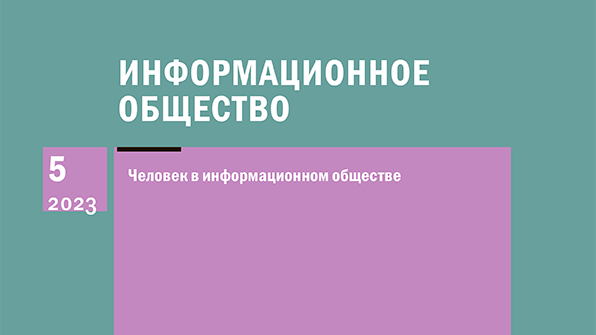The fifth issue of the scientific and analytical journal “Information Society” for 2023 has been published.
The main theme of the release is “The human in the information society”. It is revealed in 15 articles devoted to the following:
Smart city and related political and informational risks
Social value of data
Virtual collaboration
Modern practices of media consumption
Cyberethnicity as a modern form of cultural self-organization
Progressive hybrid learning technologies
Training of “digital workers”
Artificial intelligence against corruption
Digital diasporas in networks
Digital security monitoring
In her address to readers, the editor-in-chief of the magazine Tatiana Ershova wrote:
The current issue of our journal is rich in articles under the heading “The human in the information society,” and this cannot but rejoice. The magazine has been in existence for 34 years and regularly addresses various aspects of the impact of technology on human life in all its manifestations. However, only at the end of 2008 the editorial board decided to allocate a special section to discuss this problem. It was called “Information society: people”, and in the double issue 5-6 six articles were published at once, discussing the topics of consumption of ICT products, human development, tolerance, as well as information culture, and creativity.
In 2009, the column was launched to be called “Humanitarian aspects of the development of the information society,” and in the first issue five articles were published, which continued the consideration of the mentioned problems, and also included topics of humanitarian computer science and the influence of the Internet on the lives of older people. The column gained a foothold, but for almost five years only seven articles were published in it. Given their small number, one cannot fail to note the seriousness of the issues considered in them: the phenomenon of euthanasia from the standpoint of global sociocultural and information and communication transformations; the crisis in the consciousness of modern human; the transformation of the model of reality; multirational communication, etc. And issue 1 for 2011 contained materials of the international panel discussion “Information Society: Humanitarian Aspects of Modernization”, held on October 15, 2010 at the V Forum of Creative and Scientific Intelligentsia of the CIS Member States “Innovative and Humanitarian Partnership – the Basis of the Dynamic Development of the CIS Countries.” They all were published in full.
The release of the last issue in 2013 was marked by a new renaming of the humanitarian section. Now it has become known as “The human in the information society”, and has existed in this form for almost 10 years. Since then, it has published 34 articles, which means that there were no more than four such articles per year. A little better than in the previous five-year period, but still clearly not enough for a journal open to philosophers, sociologists, historians, lawyers, psychologists, cultural experts, art historians, and political scientists.
Of course, further attention deserves research into the anthropological crisis of civilization, dehumanization and alienation of communication in the era of globalization, transformation of human thinking and behavior, information consumerism, information disorientation, the impact of information and various computer programs on the human psyche and behavior, information wars, social support for vulnerable groups population with the help of digital technologies, the development of human capital in the information society, network interaction and its various manifestations (from useful to dangerous), the influence of artificial intelligence on people’s lives, the role of natural intelligence in the context of digital transformation, the relationship between technology and humans, and many others.
We look forward to articles on humanitarian topics from our regular and new authors.
The contents of the issue (in Russian) are available on the journal’s digital platform.
